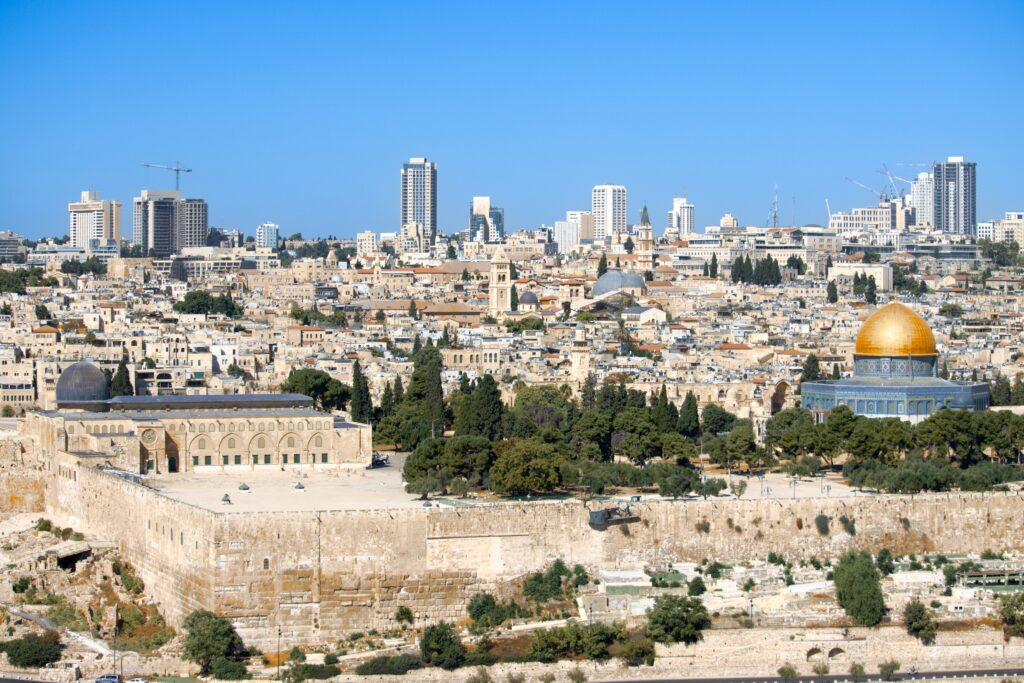Ata-ul-Haye Nasir, UK
This article contains details some readers may find distressing.
Netflix’s Farha
Farha, a film depicting the incidents of the Nakba in 1948 aired on Netflix, is causing an uproar among Israeli officials.
The film, directed by Jordanian filmmaker Darin Sallam, depicts the incidents of the Nakba of 1948:
“The film centres on the experiences of a girl, 14, who is locked in a storage room by her father during the events of the Nakba, the Arabic term for the ethnic cleansing and displacement of about 700,000 Palestinians. When nascent Israeli soldiers come to the village, Farha witnesses the killing of an entire family, including two small children and a baby, through a crack in the pantry door.” (Israel condemns Netflix film showing murder of Palestinian family in 1948 war, The Guardian, 1 December 2022)
Sallam expressed in many interviews that she made the film because while many films told Palestinian stories, few focused on the root cause of the conflict and occupation. She says that Farha was the story of a friend of her mother, who met each other as young women in Syria. (Ibid)
The film showed Farha’s father instructing his daughter to hide in a pantry at their home, as he went out to save other people. Farha saw through a crack in the pantry door that an entire family had come to her home since the woman had to give birth to a child. After the child’s birth, armed personnel came to inspect the house and after some interrogation, brutally killed the entire family.
The most disturbing scene came when the newly-born boy was still alive, and the officer-in-charge – while leaving the house – commanded his subordinate: “Kill him and follow us. And don’t waste a bullet on him.” This order shook the young subordinate, however, he had to obey the command. The moment he was about to crush the child with his foot, he stopped, turned back and kicked the ground in anger; he then just covered the child’s face with his handkerchief.
This scene manifests the brutality of the forces, whereas, on the other hand, it also shows there were people among them who did not want to carry out such inhumane treatment to the Palestinians, but they had no other option but to obey the commands of their masters.
The outgoing Finance Minister of Israel, Avigdor Liberman, condemned Netflix over its decision to stream the film and said in a statement, “It’s crazy that Netflix decided to stream a movie whose whole purpose is to create a false pretense and incite against Israeli soldiers”. (Ministers condemn ‘terrible’ Jordanian film about 1948 war slated to hit Netflix, The Times of Israel, 30 November 2022)
Without going into whether the facts presented in the film about the incidents of 1948 are all true or not, the treatment of Palestinians by Israel has become an open secret, especially on social media.

Report by Amnesty International
Earlier this year, Amnesty International released a report, titled Israel’s Apartheid against Palestinians: Cruel System of Domination and Crime against Humanity. It reported that the massive seizures of Palestinian land and property, unlawful killings, forcible transfer, drastic movement restrictions and the denial of nationality and citizenship to Palestinians were all components of a system that amounted to apartheid under international law:
“This system is maintained by violations which Amnesty International found to constitute apartheid as a crime against humanity, as defined in the Rome Statute and Apartheid Convention.” (Amnesty International’s website, accessed 3 December 2022, “Israel’s apartheid against Palestinians: a cruel system of domination and a crime against humanity”)
Agnès Callamard, Amnesty International’s Secretary General, said:
“Our report reveals the true extent of Israel’s apartheid regime. Whether they live in Gaza, East Jerusalem and the rest of the West Bank, or Israel itself, Palestinians are treated as an inferior racial group and systematically deprived of their rights. We found that Israel’s cruel policies of segregation, dispossession and exclusion across all territories under its control clearly amount to apartheid. The international community has an obligation to act.” (Ibid)
Prior to the publication of the report, Israel called on Amnesty International not to publish it, saying the conclusions of the London-based international human rights group were “false, biased and antisemitic.” (“MFA Press Release: Amnesty UK Expected to Publish a False, Biased, and Antisemitic Report Tomorrow”, 31 January 2022)
Palestine conflict and FIFA World Cup 2022
The issue of Palestine has gathered significant attention during the ongoing FIFA World Cup as well, where Arab fans have expressed support for Palestine. The Palestinians and other Arab nationals marked their presence by waving flags at various matches and in the streets, showcasing Arab unity and solidarity amid Israel’s ongoing brutal occupation of Palestinian territory. (Palestinian flags fly high at the World Cup in Qatar, Al Jazeera, 29 November 2022)
Some Palestinians expressed that “the tournament has given them a chance to raise awareness over the Israeli occupation, as well as to highlight Palestinian culture and history.” (Ibid)
During the 48th minute of the Tunisia-Australia game, Tunisian fans held up a huge flag bearing the words: “Free Palestine.” The Moroccan fans did the same the next day during their match against Belgium. (Qatar World Cup 2022: Palestine 1, Israel 0, Middle East Eye, 30 November 2022)
Tunisian fans unveiled a massive "Free Palestine" banner, in the FIFA World Cup match between Tunisia and Australia.#WorldCupQatar2022https://t.co/SOXuqQ1Q1r
— The Jerusalem Post (@Jerusalem_Post) November 26, 2022
Feras Abu Helal writes:
“For Palestinians, 48 is a key number in the memory of their national catastrophe. It refers to 1948, the year of the Nakba, when their grandparents were killed and expelled from their homeland to create the state of Israel. Many Arabs use this number to express their love and support for Palestinians.” (Ibid)

Though social media and events like the FIFA World Cup show that everyday Muslim public wants to defend their fellow Muslims and uphold their rights, in reality, Muslim nations themselves are divided. This creates courage for non-Muslim states to suppress Muslims because they know full well that Muslim countries are actually at odds with each other and have no true unity.
Need for Muslim unity
This is a point that has been mentioned by Hazrat Mirza Masroor Ahmad, Khalifatul Masih Vaa on various occasions.
In July 2014, as violence against Palestinians of Gaza escalated, during his Friday Sermon on 25 July 2014, Huzooraa said:
“With great regret, it must be said that today, it is the ill fortune of many Muslim countries that they are no longer united. Members of the public are fighting amongst themselves; citizens are also fighting with governments, whilst governments are inflicting cruelty upon their public. Therefore, not only has unity been lost, but great cruelties and injustices are being perpetrated.
“The result of the lack of unity is that non-Muslim countries now have the confidence to do whatever they please against the Muslims and this is the very reason that Israel is currently engaged in killing scores of innocent Palestinians in the cruellest manner.
“If the Muslims were united and followed the path of God, then the collective strength of the Muslim nations is so great that this cruelty could never have taken place.” (“World Muslim Leader prays for innocent Victims of Israel-Palestine Conflict”, pressahmadiyya.com)
On the other hand, Western countries should leave the hypocrisy everyone is witnessing and also raise their voices against the oppression of innocent Palestinians, with the same intensity they show when speaking about other humanitarian issues. They cannot pick and choose according to their own likings and interests; humanity must be treated equally, without any discrimination based on race, religion or colour.
The world must recognise that all oppressed people and communities deserve their sympathy, solidarity and compassion, without any discrimination. They must pay attention to the slogan raised by the Ahmadiyya Muslim Community: Love for All, hatred for none.

